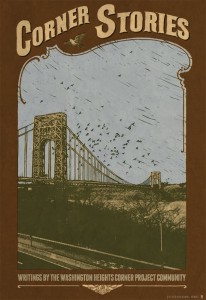Corner Stories
 Corner Stories
Corner Stories
by the Washington Heights Corner Project Community
Washington Heights Corner Project, July 2013
60 pages / $15 Buy from Washington Heights Corner Project
When I first started doing dope in my callow early twenties, I used to marvel at the raw story telling skill of the working class Vietnam veterans I bought bundles from, feeling like I had a God given duty to transcribe and capture their cant down wholesale in my journal. In the tradition of all those who slum, I felt like these men and their tales were my unique discovery. I’d absorbed the way the media uses drug users, the way they are placed in narratives as local color, punch line, or cautionary tale, and despite the fact that I was putatively joining their ranks, I wanted to pin these people to the page like so many trash talking, street wisdom dispensing specimens. I didn’t understand then that it was only in the first person that these voices had meaning.
The pieces in this collection, the literary magazine of the Becoming Writers workshop for participants of harm reduction organization the Washington Heights Corner Project, are indeed Corner Stories. As an injection drug user, I felt a great sense of comfort and familiarity reading these accounts, which sound so similar to the oral histories one hears passed down wherever drug users gather. It’s all here, from the lamentations about the difficulty of hustling, to the wily, wary disclaimers (“I wouldn’t recommend it to anyone”) and the paeans to the glory of the heroin of yesteryear (“a bag of dope back then was big…a lot of powder in one bag, enough to get two or three friends high,” Rubert Rey reminisces in “First Brush with Danger.”) Corner Stories also reminds me of the popular tradition of zines created by low-income rights and harm reduction organizations the nation over—Junkphood and the newsletters of Arise for Social Justice, for example. But Corner Stories is qualitatively a different project in the sense that finally, the oral history of drug users is being marketed and made accessible to the mainstream world.
Melissa Petro, editor of the lit mag and teacher of the workshop, writes in the introduction to the volume, “Maybe you have used drugs, or maybe you have never. Either way, there’s sorrow and pain in everyone’s life, just as there is joy. We all struggle to make purpose and meaning…” But most of the time, the struggles of drug users aren’t made known to the rest of the world, unless they’ve been watered down into the rote formulas of the recovery story or the special pleading of the confessional memoir. The simple folk wisdom of the subculture that I’ve heard while sitting around a circle fixing up, I’ve almost never seen written down, and certainly almost never for mass consumption.
September 27th, 2013 / 11:00 am
